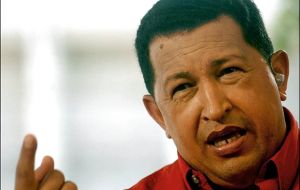MercoPress. South Atlantic News Agency
Tough year ahead for Venezuelan president Hugo Chavez
 Shortages of power and water, and a strong devaluation of the currency have eroded support for Chavez
Shortages of power and water, and a strong devaluation of the currency have eroded support for Chavez Venezuelan president Hugo Chavez is facing a tough 2010 with growing complaints over shortages of electricity and water and a sharp currency devaluation that could harm the chances of his supporters in congressional elections in September.
In a sign he may be preparing for a combative year, Chavez has responded to these challenges by designating a vice president known for radical views and pushing the opposition station RCTV off subscription TV networks.
The move against RCTV has sparked opposition protests this week during which two students have been killed.
“If you're going to head down the path of destabilization, I'm warning you it will yield the opposite result of what you're seeking -- that we may decide to speed up the changes,” Chavez, who recently declared himself a Marxist, said in televised comments.
Chavez has nationalized large swathes of the economy in recent years, including the telecommunications and the electricity sector -- which now faces deepening problems.
This month he took over a hyper-market chain run by a French retailer after accusing the company of price gouging.
Opposition and pro-Chavez students held rival but small rallies on Wednesday, gathering on campus and in public squares, and prepared a wave of marches in the coming days.
Chavez late Tuesday tapped Agriculture Minister Elias Jaua to be vice president following this week's resignation of Ramon Carrizalez, a long-time Chavez confidant who also served as defence minister.
Jaua, who will maintain his post as agriculture minister, is a former university student activist with a calm demeanour but a reputation for being among Chavez's more radical protégés.
He was a key leader of Chavez's land reform campaign that expropriated a number of large farms and divided the land among poor small farmers, grabbing international headlines and spooking Venezuela's agribusiness leadership.
Chavez so far this month has fused the finance and planning ministries, replaced the environment and defence ministers and sacked the electricity minister, in part a reflection of his chronic struggle to find qualified advisors he trusts.
Authorities are preparing to renew a power-rationing plan for Caracas, the capital, after Chavez scrapped an earlier effort -- firing his electricity minister in the process -- that left the city in chaos and angered his supporters.
Discontent over these issues has breathed life into an opposition campaign to overturn Chavez's near-complete control over Congress in elections set for September.
Venezuela is struggling to keep electricity flowing due to a prolonged drought that has crippled dams that generate 70% of the country's power and forced rationing of household water.
Late Wednesday it was announced that three television channels that Venezuela's cable and satellite TV providers recently dropped for allegedly violating new broadcasting regulations will be permitted to return to paid television programming.
Venezuela's telecommunications agency said that TV Chile, American Network and Ritmo Son have complied with rules approved last month by Chavez's government. The rules have increased concerns that Chavez is trying to silence his critics.




Top Comments
Disclaimer & comment rulesCommenting for this story is now closed.
If you have a Facebook account, become a fan and comment on our Facebook Page!